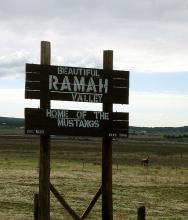Article
Originally settled by Mormon pioneers, who intended to perform missionary work in Zuni and Navajo communities, Ramah sits between the Zuni and Ramah Navajo Reservations. The town was initially intended to be both a spiritual and agricultural center. It currently provides direct access to the Cibola National Forest, El Morro and El Malpais National Monuments, a wolf sanctuary, and a seasonal farmer's market with close ties to the town's original pastoral inhabitants.
"Welcome sign entering Ramah, New Mexico" by Notbob 1647 is in the Public Domain.
Manuscripts
References
Landgraf, John Leslie
1954 Land-Use in the Ramah Area of New Mexico: An Anthropological Approach to Areal
Study. Reports of the Ramah Project, report, no. 5; Papers of the Peabody Museum of
American Archaeology and Ethnology, Harvard University 42(1). Cambridge: The
Museum.
Leighton, Dorothea Cross, and John Adair
1963 People of the Middle Place: A Study of the Zuni Indians. New Haven: Human
Relations Area Files.
Wyaco, Virgil, John Alan Jones, and Carroll L. Riley
1998 Zuni Life: A Pueblo Indian in Two Worlds.” Albuquerque: University of New Mexico
Press.

